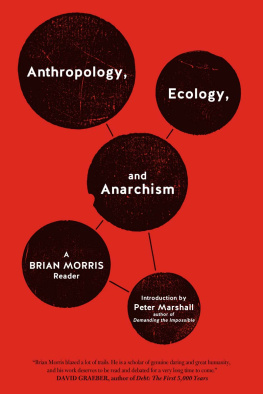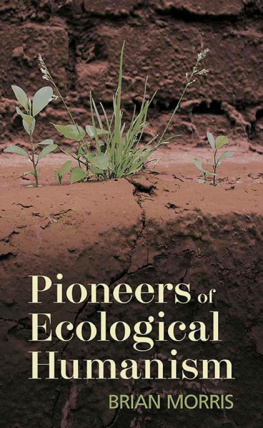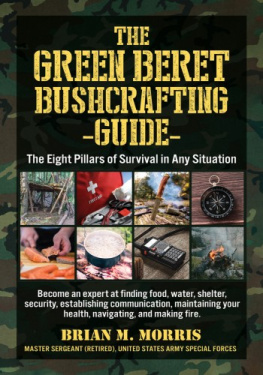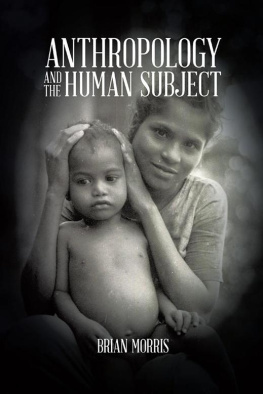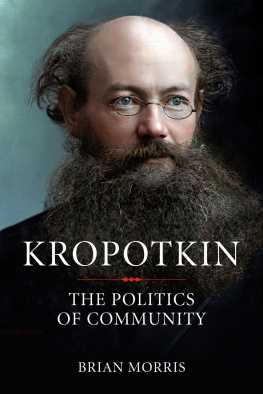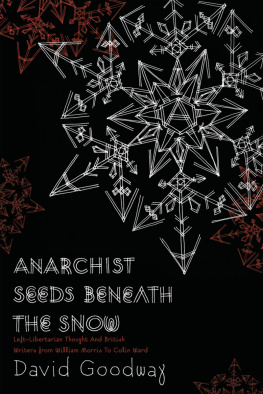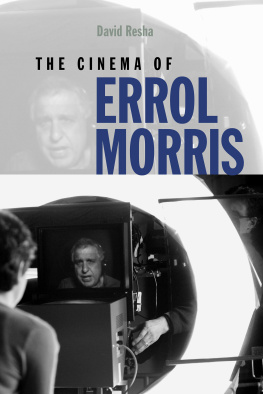Brian Morris blazed a lot of trails. He is a scholar of genuine daring and great humanity, and his work deserves to be read and debated for a very long time to come.
David Graeber, reader in social anthropology, Goldsmiths, University of London
This is a marvelously original book bursting with new ideas. I have read it with enormous interest and admiration. This collection of essays is an outstanding contribution to anthropology, environmental thought, and anarchism.
Andrej Grubai, professor and department chair in Anthropology and Social Change, California Institute of Integral Studies
Before there was anarchist anthropology, there was Brian Morris. This collection introduces the work of an intrepid pioneer, taking anarchist perspectives to where you would least expect them.
Gabriel Kuhn, editor and translator of All Power to the Councils! A Documentary History of the German Revolution of 19181919, Liberating Society from the State and Other Writings by Erich Mhsam, and Revolution and Other Writings by Gustav Landauer
There is very little I can add to the outstanding criticism Brian Morris levels at deep ecology insightful as well as incisive . I have found his writings an educational experience.
Murray Bookchin, author of The Ecology of Freedom and Post-Scarcity Anarchism
As well as a respected academic and author of many works on social anthropology, Brian Morris has also been a prolific writer on ecology and anarchism. There is, though, little name recognition amongst libertarians. It has largely depended on whether one was fortunate enough to be a reader of one of the periodicals to which he contributed. The present selection is therefore a notable event; and it is to be hoped that Morris will now break through to the wide and appreciative anarchist audience he deserves.
David Goodway, author of Anarchist Seeds Beneath the Snow and Talking Anarchy (with Colin Ward)
Brian Morriss scholarship is nothing if not compendious . Morriss achievement is formidable. His control of such a breadth of material is enviable, and his style is always lucid. He makes difficult work accessible. His prose conveys the unmistakable impression of a superb and meticulous lecturer at work.
Anthony P. Cohen, University of Edinburgh
Morris writes from a critical sociological approach and is trenchant though good-humored.
C. James MacKenzie, University of Lethbridge
Morriss acerbic analysis of established literature is matched by nuanced ethnographic analysis . He writes accessibly about complicated matters.
Allen F. Roberts, University of California, Los Angeles
The elusive nature of the human subject has provided an abundant basis for discussions in both the social sciences and the humanities. Working within a largely anthropological tradition, Morris examines these discussions with considerable acumen.
Heidi Storl, Augustana College (IL)
Morris draws on an incredible range of knowledge, and approaches his writing in a spirit of critical appreciation, with a style which is free of posturing and point scoring.
Direct Action
[Morris] is a polymath, interested in a broad spectrum of politics, philosophy, ecology and education, and he has pushed out the frontiers of his chosen discipline. He is someone who looks for interconnections and seeks to understand the whole.
Pat Caplan, Goldsmiths College, London
Brian is one of those rare academics who want to spread ideas through teaching and writing for a wide range of publications rather than through obscure academic texts. His writing is always well researched and scholarly whilst remaining accessible to a wide audience.
Organise!
Anthropology, Ecology, and Anarchism: A Brian Morris Reader
2014 PM Press.
All rights reserved. No part of this book may be transmitted by any means without permission in writing from the publisher.
ISBN: 9781604860931
Library of Congress Control Number: 2013956919
Cover by John Yates / www.stealworks.com
Interior design by briandesign
10 9 8 7 6 5 4 3 2 1
PM Press
PO Box 23912
Oakland, CA 94623
www.pmpress.org
Printed in the USA by the Employee Owners of Thomson-Shore in Dexter, Michigan. www.thomsonshore.com
To the memory of an inspiring teacher,
Mr. L.W. Bennett, who encouraged me to read books
Contents
Acknowledgments
I am appreciative of the journals and magazines that have published my various writings over the last decade, and convey my warm thanks to the editors of the New Humanist, Critique of Anthropology, Democracy and Nature, Social Anarchism, Anarchy, and Anarchist Studies. I should also like to thank my family and many friends for their support and encouragement, and to especially thank Angela Travis and Sue Lloyd for seeing the book through the press.
Introduction
by Peter Marshall
Brian Morris has done many things but he is above all a professor emeritus in anthropology. Before doing his doctorate research on hunter-gatherers in Southern India he was a tea planter in Malawi and this led to a lifelong interest in the people, animals, and insects of that country. He has had a passionate concern with natural history and ecology as well as anthropology. His many writings include the full-length studies Forest Traders (1982), Anthropological Studies of Religion (1987), Western Conceptions of the Individual (1991), and Anthropology of the Self (1994). He says that he came to anarchism in the 1960s when he met an anarchist who persuaded him of the importance of freedom. I first met him in the 1980s at the Anarchist Research Group at the Institute of Historical Research at London University and we have kept in touch on and off ever since. He has not only written about the natural historians and pioneers of what he calls Ecological Humanism but full-length studies of the Russian anarchist thinkers Bakunin and Kropotkin. He seems most inspired by the latter thinker, especially by his emphasis on mutual aid and his deep ecological sensibility. He has already written in 1996 a collection of essays called Ecology and Anarchism.
The present collection, combining his interest in anthropology, ecology, and anarchism, is therefore to be warmly welcomed. Many of the essays and reviews have been published in comparatively obscure journals and are therefore usefully brought together here. They are scholarly yet accessible; erudite yet the learning is worn lightly; historical yet often addressing burning issues of the day. As ever Morris is a prolific polymath, thoughtful, original, and full of insight. His style is not turgid and full of jargon like many academics in his field but flows naturally and reads well. He is informed, eclectic, and widely read.
These essays show a close relationship between anthropology, anarchism, and ecology (the human subject, society, and the natural world). As Morris makes clear, anarchism is not a utopian dream or terrorist nightmare; it is firmly based in the real world and shows the potential of all human beings to live in a more just, equal, and free society close to nature and all that live within it.
The first essay, analysing theorists in anthropology, psychology, and sociology, concerns the rise and fall of the human subject. He concludes that there is little to be gained by taking an extreme position either expunging the human subject from critical analysis or collapsing him or her in cultural relativism. Culture does not pre-exist the human subject but they dialectically coexist.
Next page
